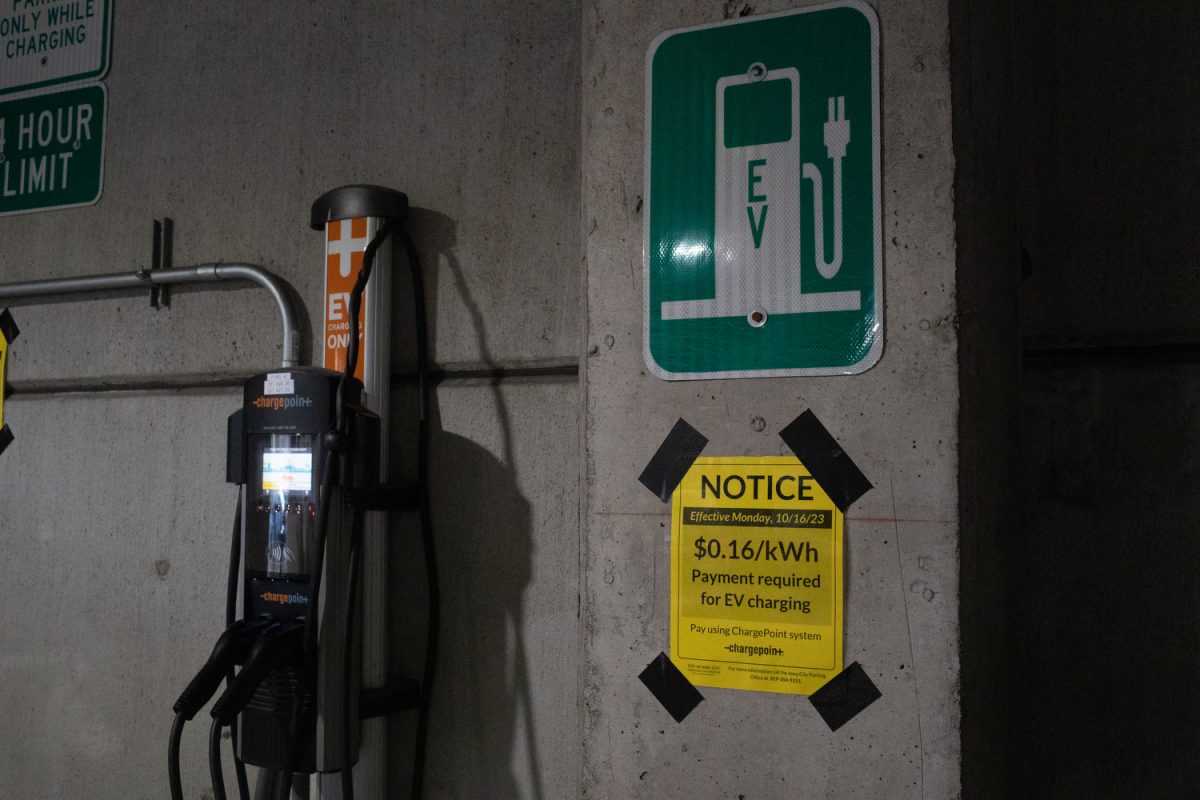Iowa City electric vehicle users will now have to start paying a fee to charge their vehicles at the city’s public charging stations.
According to a release on the city’s website, the city began charging 16 cents per kilowatt hour on Oct. 16 as a result of a new state tax that has recently been added to electric vehicle charging in non-residential locations.
The purpose behind the state tax is so the state can try to recoup some of the revenue lost from diesel and gasoline taxes as more people switch to using electric vehicles. The new tax is 0.026 cents per kilowatt hour, and it took effect on July 1.
According to Mark Rummel, the city’s associate director of transportation services, there are two charging stations in each of the six public parking ramps in the city. Previously, electric vehicle users only had to pay to get into the ramp, and the charging stations were free. Users are limited to four hours to stay in a parking stall and use the chargers.
The city has a total of 12 charging stations with two additional stations being added in the Dubuque Street and Chauncey Swan parking ramps by mid-spring of next year, Rummel said.
At the Aug. 1 city council meeting, Darian Nagle-Gamm, the city’s transportation director, said the 16-cent fee was decided upon by city staff after they evaluated the expenses associated with electric vehicle charging.
Nagle-Gamm said there are four costs associated with the charging stations: electricity, fees with ChargePoint, which is the app electric vehicle users use to operate the chargers, maintenance, and now the new state tax.
The new 16 cent fee will ensure the city will break even on these costs and recoup funds spent by the city in the past, Nagle-Gamm said. She said the expenses related to the charging stations in 2022 added up to around $10,500.
The transition to having to pay for charging should be a somewhat simple one for users because the ChargePoint app requires that you connect a credit card to the app even if charging is free, Nagle-Gamm said.
Going forward, the fee will be assessed by city staff on a regular basis to ensure they are maintaining a breakeven level, Nagle-Gamm said.
Even though electric vehicle charging in the city will no longer be free, it will still be significantly cheaper than gas prices. Dan Bissell, a climate action analyst for the city, said the 16-cent fee is equivalent to $1.25 per gallon for gas.
The average cost for a new gas-powered car is $44,700, and the average cost for a new electric vehicle is around $53,500. At the 16 cent per kilowatt hour rate, the average monthly cost to charge an electric vehicle is $60 per month.
In recent years, the city has seen a substantial increase in the usage of its charging stations. The city first started offering electric vehicle charging stations in 2017. Since then, the number of charging sessions each year has increased from 185 to 6,317 so far this year, Bissell said.
Bissell said encouraging people to switch to electric vehicles is one way the city tries to reach its climate action goals. The overall goal for the city is to reach net zero emissions by 2050.
According to the city’s climate action website, the city had a little under 800,000 tons of carbon dioxide emissions in 2022, which is right at their target for 2030. Since 2017, the city avoided just under 168,000 kilograms of greenhouse gas emissions from electric vehicle usage, Bissell said.
The city council first discussed the adoption of the tax at its meeting on Aug. 1. It was then voted on twice and adopted on Sept. 5.
At the Aug. 1 meeting, Mayor Bruce Teague said he thinks this added fee will also be a good way to make sure people are mindful of how long they are using the chargers so others can use them in a timely manner.
“I think it’s a great option for people to have the ability to go and charge up,” Teague said. “And if you’re there to sit and idle, I think it’d be an incentive to go and move your car so someone else can reap the benefits of getting some charge as well.”



